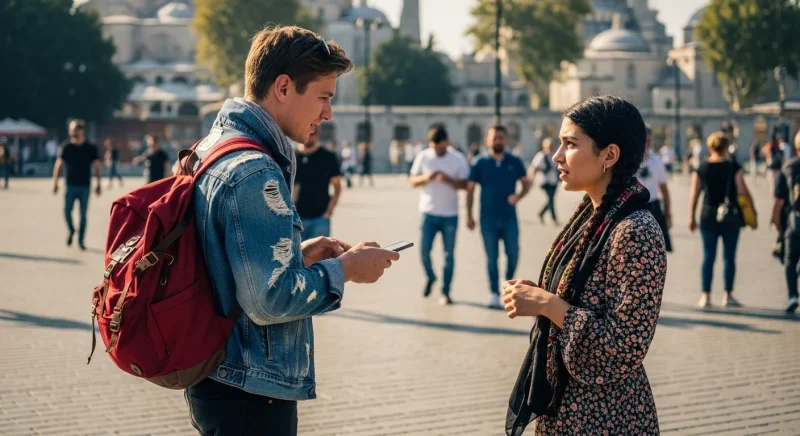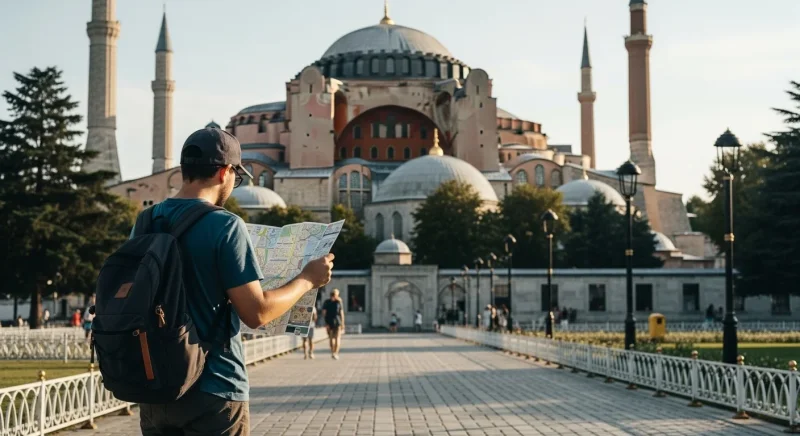If you're planning to visit Turkey for the first time or just looking for general information about the country, you might be wondering: What language do people speak there? The answer is simple: Turkish.
But of course, that’s just the beginning of the story. Turkey is a multicultural, multilingual country. While Turkish is the main language, you'll hear other languages in different regions as well. So let’s start from the basics.
The Official Language of Turkey: Turkish
Turkish is the official language of Turkey. It’s the language used in government offices, schools, courts, and on all official documents. On the street, in markets, at schools, on TV, basically everywhere, you’ll hear people speaking Turkish.
It belongs to the Ural-Altaic language family. That might sound a bit technical, but here’s the key point: Turkish is an agglutinative language. That means you add different suffixes to a word root to build new meanings. For example, the root "gel" (come) can become "geleceğim" (I will come), "gelmeyeceksin" (you won’t come), or "geliyordu" (he/she was coming).

The Turkish alphabet is based on the Latin script, just like English, but it has a few unique letters like "ç", "ş", and "ğ". They might look unfamiliar at first, but once you get used to them, they’re actually quite straightforward.
And here’s something nice: Turkish people generally appreciate it when foreigners try to speak their language. Even a simple "merhaba" (hello) or "teşekkür ederim" (thank you) can bring out a big smile.
Can You Get by with English in Turkey?
Yes, but it depends on where you are. In big cities like Istanbul, Izmir, Ankara, or Antalya, finding someone who speaks English is usually pretty easy. Young people especially tend to speak English well. University students, people working in tourism, café staff, and hotel employees often speak enough English to communicate comfortably.

In tourist areas, English is even more common. In places like Bodrum, Fethiye, and Cappadocia, locals interact with foreign visitors almost every day, so they’re used to speaking English. A simple “Merhaba!” followed by a switch to English will often get you a reply in fluent English.
However, if you head into more rural parts of Anatolia, especially smaller towns and villages, the number of English speakers drops significantly. People there often don’t use English in daily life, so don’t expect easy communication without a few Turkish phrases.
Other Languages Spoken in Turkey
Turkish is the official language, but it’s not the only one you’ll hear. Turkey has hosted many cultures over the centuries, and that diversity is still reflected in the languages spoken today.
The second most commonly spoken language is Kurdish, especially in southeastern Turkey. In many homes and communities, Kurdish is used in daily life. Even though government services are in Turkish, you’ll find many people who speak little to no Turkish at home.

You’ll also hear Arabic more often now, especially in cities like Istanbul, Gaziantep, Sanliurfa, and Mersin. This is mainly due to the large number of people who came from Syria during the civil war. In some neighborhoods, Arabic signs, menus, and even conversations are part of daily life.
Other languages spoken by smaller communities include Zaza, Laz, Circassian, Bosnian, Greek, and Armenian. These are usually preserved within families or cultural associations.
Helpful Language Tips for Traveling in Turkey
Don’t worry if you don’t speak Turkish. But learning a few basic words can go a long way. It makes communication smoother and shows locals that you're making an effort.
Here are a few key Turkish words and phrases:
| Turkish | English | Pronunciation |
|---|---|---|
| Merhaba | Hello | Mehr-hah-bah |
| Günaydın | Good morning | Goo-nahy-dun |
| İyi akşamlar | Good evening | Ee ak-sham-lar |
| İyi geceler | Good night | Ee ge-je-ler |
| Teşekkür ederim | Thank you | Teh-shehk-kur eh-deh-reem |
| Sağ olun | Thanks (formal) | Sah oh-loon |
| Lütfen | Please | Lüt-fen |
| Evet | Yes | Eh-vet |
| Hayır | No | Hah-yur |
| Afedersiniz | Excuse me / Sorry | Ah-feh-der-sin-iz |
| Özür dilerim | I’m sorry | Uh-zur dee-leh-reem |
| Anlamıyorum | I don’t understand | An-lah-muh-yo-room |
| Bilmiyorum | I don’t know | Beel-myo-room |
| İngilizce biliyor musunuz? | Do you speak English? | Een-gee-leez-je bee-lee-yor moo-soo-nooz |
| Ne kadar? | How much? | Ne kah-dar |
| Bu ne? | What is this? | Boo neh |
| Nerede? | Where is…? | Neh-reh-deh |
| Tuvalet nerede? | Where is the toilet? | Too-vah-let neh-reh-deh |
| Hastane | Hospital | Has-tah-neh |
| Polis | Police | Poh-lees |
| Su | Water | Soo |
| Yemek | Food | Yeh-mehk |
| Fiyat | Price | Fee-yaht |
| Ekmek | Bread | Ek-mek |
| Havalimanı | Airport | Hah-vah-lee-mah-nuh |
| Otobüs | Bus | Oh-toh-boos |
| Taksi | Taxi | Tahk-see |
| Yardım edin | Help me | Yar-dum eh-din |
| Giriş | Entrance | Gee-reesh |
| Çıkış | Exit | Chuh-kush |
Useful Language Apps
- Google Translate: Works anywhere, even offline. You can point your camera at menus or signs for instant translation.
- Duolingo: A fun way to learn basic Turkish phrases and grammar.
- Sesli Sözlük: A fast and reliable English, Turkish dictionary.
- Babbel: Offers structured Turkish lessons for a deeper learning experience.
Is the Language Barrier Really a Problem in Turkey?
Honestly, not in the big cities or tourist spots. If you walk into a café in Istanbul, chances are the waiter speaks English. The same goes for hotels in Antalya, tour guides in Cappadocia, and restaurants in Bodrum. In these places, the language barrier is almost non-existent.
But once you go off the beaten path, into smaller towns or rural villages, things change. You might struggle to find someone who understands English.
The good news? Turkish people are incredibly friendly and helpful. Even if they don’t speak your language, they’ll try their best to assist you, with hand gestures, facial expressions, or a quick translation app. So don’t stress, kindness is a universal language, and it goes a long way in Turkey.
Comments (0)
Sign in to comment
Report